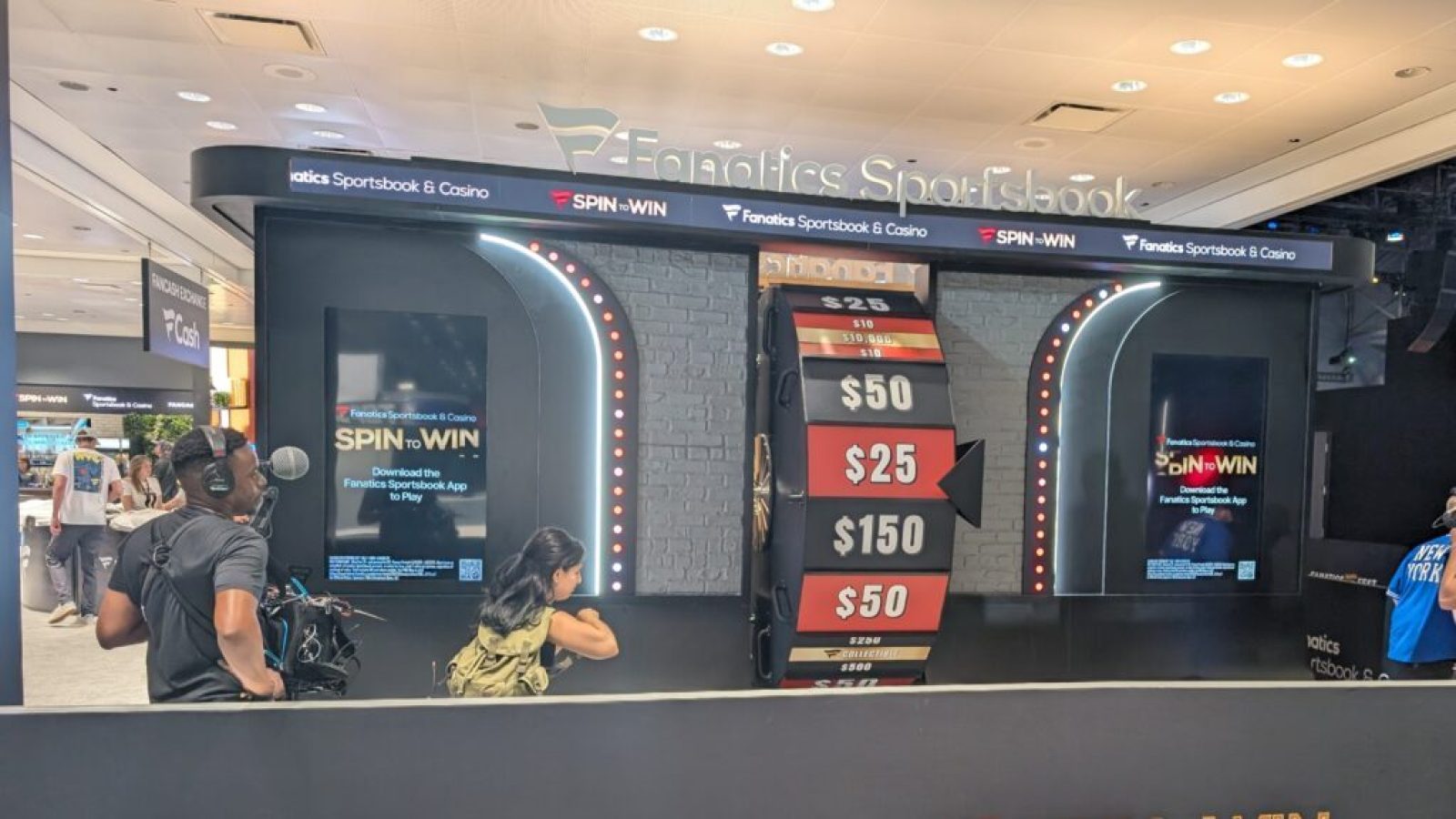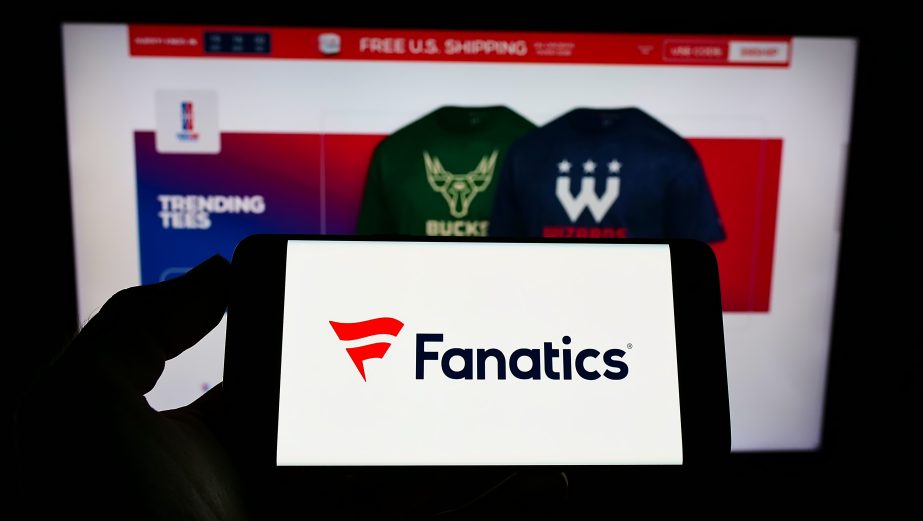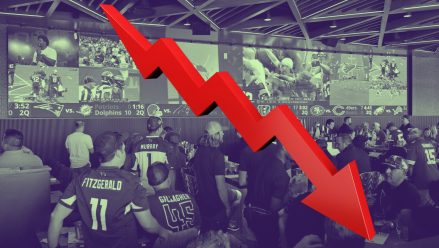The list of top sports betting operators in the U.S. mostly seems to break neatly into groups, defined by each one’s major pre-PASPA revenue stream.
At the top, you have the former daily fantasy operators, who turned into sports-betting-first giants.
Then below them are a handful of sportsbooks from big names in land-based gaming.
Look at the graveyard of operators that have pulled out of the market and you might see some European sportsbooks that hoped to crack the U.S., alongside some operators tied to media properties.
But the newest entrant into the second tier does not fit into the established categories. Fanatics Sportsbook, which sits third in market share in many states, is the betting arm of an apparel giant.
In 2024, Fanatics’ total revenue across its entire business came to $8.1 billion. Of that figure, betting made up $300 million, or less than 4% of the business. The sportsbook has continued to grow since then, but it’s still only a small portion of the overall Fanatics operation, and would have to be larger than FanDuel to catch up to Fanatics’ commerce arm.
Ultimately, it’s a business that doesn’t need sports betting. If it never got involved in the sector, or if the whole venture turned out to be an expensive failure, there’d still be a huge retail and collectibles company making billions of dollars for founder and CEO Michael Rubin.
Late-comer
What it means to enter sports betting from the world of commerce probably starts with the timing of when Fanatics actually launched.
Talk of Fanatics entering the sportsbook space seemed to go on forever before the brand finally went live in August 2023 after acquiring PointsBet’s U.S. businesses, giving it licenses in most legal states. While other businesses — feeling a stronger need for U.S. sports betting revenue — jumped in early, Fanatics had the capital and consistent revenue from other sources to wait a little longer and make a deal once valuations were less inflated.
There are also certain practical benefits to having a large, existing national business. The value of the Fanatics customer database is clear, and integrating the rewards system with the commerce business seems to have been a benefit too.
“From that database lens, our non-sports betting business lends itself to what we want to do much more than a brick-and-mortar database, where you only have so many customers,” Fanatics Betting & Gaming COO Scot McClintic said. “If that’s your strategy, you’re only going to be able to get so far before you top out.”
But being part of something unrelated to gaming has also allowed the business to be, in McClintic’s words, “pro-risk.”
The freedom afforded by being part of a company that doesn’t need big returns immediately — almost playing with house money — also seems to have informed Fanatics’ marketing strategy: It has gone big on marketing during a time when other operators have reduced their spend.
Data from Eilers & Krejcik Gaming shows Fanatics has been willing to outspend its rivals on promos. It’s too early to tell what the return on its investment might be, but it’s gaining market share.
It also let the business survive a start that McClintic admits wasn’t always ideal. When the product launched, Eilers & Krejcik rated it as the sixth-best app available, and McClintic admits the app was “breaking” too frequently.
“Frankly, the first couple of years we had were very rocky,” he said. “2023 was a very painful year. But now we’re kind of on the receiving end of the bets we made, pun intended, at that time.”
And taking a bit more time and being willing to spend allowed Fanatics to assemble an all-star cast of executives. Fanatics Betting & Gaming CEO Matt King came over from FanDuel, where he led the brand to the no. 1 spot in the U.S. sports betting market.
King was joined by a few other members of the team that made FanDuel the market leader: Chief Technology Officer Ian Botts came from FanDuel too, and Chief Business Officer Ari Borod was there as well, with a stop as chief operating officer at the Action Network in between.
But the business has picked up talent from elsewhere too, including plenty of international names. The PointsBet deal gave Fanatics executives like Chief Revenue Officer Aonghus Mulvihill — a commercial director at Betfair before joining PointsBet — and Chief Product Officer Mark Hughes — who founded Banach Technology before it was acquired by PointsBet. Meanwhile, last year, the business hired former Flutter UK & Ireland boss Conor Grant, who led a market-leading group of brands from Paddy Power to Sky Bet before joining Fanatics.
How things ‘should’ be done
Fanatics isn’t quite the only business running a sportsbook that would still make lots of money if its betting operations are a flop. Land-based casino giants like Caesars, Penn Entertainment, and MGM could all point to a large and profitable operations outside of sports betting.
But coming from a space outside of gaming entirely, Fanatics seems to be in a unique position among the big players.
First, there’s not much of an obvious connection between betting and apparel the way there is between betting and gaming. If a major casino operator’s sportsbook struggles, that has clearer knock-on effects for how customers view the entire business.
Second, Fanatics entered U.S. sports betting with very few preconceptions about how things “should” be done, the way a business with existing betting or gaming operations might.
How does that manifest in its actual offering?
McClintic points to Fanatics’ “fair play” policy as an example.
If a player that’s the subject of a prop bet gets injured early in a game and is out for its remainder, the operator will refund the bet. If it’s part of a parlay, that leg will be voided and the remainder of the wager plays out. Refunding bets due to injury is not the norm.
“And that, I think, comes from our understanding of what it’s like to be in the customer’s shoes,” McClintic said.
It’s something of a marketing gimmick, but one that seems to be working.
Some in the betting community deride the idea that a gambler should expect refunds in the event a player they bet on gets injured. Injuries, they note, are part of the game, and money spent refunding lost bets could be put toward making prices sharper instead.
Fanatics decided to just make those refunds part of its policy.
And by applying the rule uniformly, it’s just become how things work if you bet at Fanatics, the same way injuries are part of the game for bets elsewhere.
No quarterly updates
Business-wise, there’s another big difference between Fanatics and most of its rivals.
It may be convenient for strategy decisions — if occasionally frustrating for those covering the business — that Fanatics, as a privately held company majority-owned by Rubin, doesn’t have the same reporting obligations as listed peers.
That’s allowed the operator to spend on marketing even as other operators are pestered about showing returns for shareholders every three months. Maybe it’s not a coincidence that the other operator that’s gaining share right now — bet365, which has also been outspending rivals with promos — is also privately held.
Does McClintic — formerly of public businesses like Penn National Gaming and Paysafe — enjoy being free from the quarterly reporting cycle?
“Oh my god, yes,” he said. “That was one of the most challenging things I experienced with Penn, and you see it with DraftKings, with Flutter, with Entain and MGM. You always have to be generating some kind of growth. And when you’re a second-mover like we are, with the ambition that we have, it’d be very easy if you’re publicly traded to just over-index on the short term. Analysts ask, ‘Where’s the same-game parlay feature? Why aren’t you live in this state yet?’ Whatever the question is, you’re getting that pressure, and that can lead to very bad product decisions.”
Occasionally rumors spring up about the business — either all of Fanatics or just the betting arm — going public. It doesn’t seem like that’s on the immediate horizon, though.
“We view being private, for the time being, as a competitive advantage,” McClintic said. However, he also acknowledged that the business is entering a phase where the advantages are becoming less relevant.
‘We want to be number one’
It should probably also be noted that Fanatics isn’t the only sports-related non-gaming business to at least have its name plastered over a sportsbook.
A handful of non-betting businesses — mostly media outlets like Fox, Sports Illustrated, Barstool, or, more recently, ESPN — made efforts to enter the sports betting world via licensing out or selling their brand, but let the betting people actually handle the operation.
“We could have just white-labeled everything, and gone all-out with marketing,” McClintic said. “Instead we decided to do the deal we did with Amelco where we got source code and then iterated on that until the version we have looks nothing like any version of Amelco anywhere else in the world.”
The “let someone else do the product” idea seems like a pretty sensible strategy. If your company doesn’t have any in-house gambling expertise, why build out a whole new division to compete with multi-billion dollar businesses that have been running a sportsbook for much longer?
But — barring a big turnaround from ESPN Bet this year — it looks like a concept that hasn’t worked. Without a product built for the target customer base, it seems branding can only get you so far.
“The decisions that we made early on from a technology perspective, the fact we decided to buy the Amelco source code and work on that to make it our own, speak to what we wanted to achieve,” McClintic said.
McClintic puts Fanatics’ decision to work on its own product down to Rubin’s desire to be number one. In some ways, that’s the other difference between Fanatics and a sportsbook linked to a media property or land-based casino operator.
Knowing that sports betting doesn’t need to be a roaring success, other operators seemed to aim for a solid but unspectacular market share. Fanatics — whether or not it can ever actually make it — seems determined to try to enter FanDuel and DraftKings’ territory.
“We want to be number one,” McClintic said. “There’s a certain kind of alchemy in our DNA in that we have the right people, but we all just want to win so badly.
“We’ve come a long way but we haven’t really proven anything. Well, we’ve proven we can get to third place, but to us that isn’t really proving a lot.”








